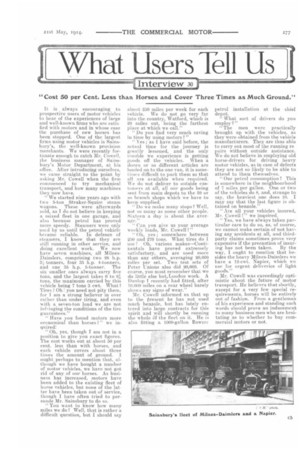What Users Tell Us "Cost 50 per Cent. Less than Horses and Cover Three Times as Much Ground."
Page 9

If you've noticed an error in this article please click here to report it so we can fix it.
It isalways encouraging to prospective users of motor vehicles to hear of the experiences of large and well-known firms who are satisfied with motors and in whose case the purchase of new horses has been stopped. One of the largest firms using motor vehicles is Sainslousy's., the well-known provision merchants. We were recently fortunate enough to catch Mr. Cowell, the business manager of Sainsbury's Motor Department, at his office. After introducing ourselves, we came straight to the point by asking Mr. Cowell when the firm commeaced to try mechanical transport, and how many machines they now have.
" We started nine years ago with two 5-ton Straker-Squire steam wagons. These were afterwards sold, as I do not believe in keeping a mixed fleet in one garage, and also because petrol has proved more speedy. Steamers were only used by us until the petrol vehicle beearne reliable. In defence of steamers, I know that they are still running in other service, and doing excellent work. We now have seven machines, all MiinesDaimlers, comprising two 28 tanners, four 35 h.p. 4-tonners, and one 35 h.p. 5-tonnes. The six smaller ones always carry five tons, and the largest takes 6 to 6,', tons, the maximum carried by this vehicle being 7 tons 3 cwt. What ? Tires? Oh ! you need not pity them, for 1 am a strong believer in over rather than under tiring, and even with a seven-ton load we are not infringing the conditions of the tire guarantees."
" Have you found motors more economical than horses ? " we inquired: "Oh, yes, though I am not in a position to give you exact figures. The cost works out at about 50 per cent. less than with horses, and each vehicle covers about three times the amount of ground. I ought perhaps to mention that, although we have bought a number of motor vehicles, we have not got rid of any of our horses. As business has increased, motors have been added to the existing fleet of horse vehicles, but none of the latter have been taken out of service, though I have often tried to persuade Mr. Sainsbury to do so.
"You want to know how manymiles we do ? Well, that is rather a difficult question, but I should say about 250 miles per week for each vehicle. We do not go very far into the country, Watford, which is 20 miles out, being the farthest place at which we call."
"Do you find very much saving in time by using motors? "
" Yes ; as I have said before, the actual time for the journey is greatly lessened, and the only trouble we experience is getting goods off the vehicles. When a dozen or so different articles are loaded on to the one van, it is sometimes difficult to pack them so that all are available when required. We do not deliver to outside customers at all, all our goods being sent from main depots to the 59 or so branch shops which we have to keep supplied.
" Do we make many stops ? Weil, not so many as some other people. 8ixteen a day is about the. average."
"Can you give us your average weekly loads, Mr. Cowell?"
"Oh. yes ; somewhere between 250 and 270 tons. What. tires do I use ? Oh, various makes—Continentals have proved extremely satisfactory, and are used more than any others, averaging 20,000 miles per set. Two test sets of Peter Unions also did 20,000. Of course, you must remember that we do little else but)tondon work. A Dunlop I recently had fitted, after 10.000 miles on a rear wheel barely shows any signs of wear." Mr. Cowell informed us that up to the present he has not used much benzoic, but has lately entered into large contracts for this spirit and will shortly be running the whole cif the fleet on it. Tie is also fitting a 1000-gallon Bowser
petrol installation at. the chief depot.
' What sort of drivers do you employ ?"
The men were practically brought up with the vehicles, as they were obtained from the vehicle manufacturers, They are thus able to carry out most of the running re pairs without outside assistance_ We do not believe in employing old horse-drivers for driving heavy motor vehicles, as in case of defects they are not so likely to be able to attend to thena themselves.
" Our petrol consumption ? This is somewhere in the neighbourhood of 7 miles per gallon. One or two of the vehicles do 8, and, strange to say, the heaviest one does 10. I may say that the last figure is obtained on benzoie."
"Are all your vehicles insured, Mr. Cowell?" we inquired.
"Yes, we have always taken particular care to do so, as, of course, we cannot make certain of not having any accidents at, all, and thirdparty claims sometimes prove very expensive if the precaution of insuring has not been taken. By the way, I ought to mention that besides the heavy Milues-Daimiers we have a l2-cwt. Napier, which we use for urgent deliveries of light goods."
Mr. Cowell was exceedingly optimistic about the future of motor transport. He believes that shortly, except for a very few special requirements, horses will be entirely out of fashion. From a gentleman of his experience and standing such words should prove ark inducement to many business men who are hesitating as to whether to buy cornmersial motors or not.


























